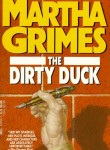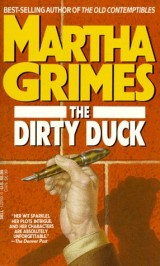September 22, 2020
 If by some strange twist of fate you missed The Dirty Duck Part I Cocktail Talk, then by all means, please, take a moment of time to read and reflect on it before you dive in here. Don’t worry, I’ll wait. Okay, back? If so, then you know more than this post will tell you about the book The Dirty Duck by Martha Grimes, as well as, perhaps, if you followed the link trail more about the book The Man With a Load of Mischief, also by said Martha. All of which would be good for you to know, me thinks, cause within both books good pubs feature prominently – heck, they provide the names for the books! And the actual Dirty Duck pub, and much/some of the action, is in lovely and Shakespeare-y Stratford Upon Avon. What I didn’t mention earlier is that in both books, Grimes has a character drinking old favorite Campari, which doesn’t make it into nearly enough books. I’m not 100% sure that our author loves the red bitter aperitivo as much as I do, though she seems like a decent person, and what decent person wouldn’t? Not a one.
If by some strange twist of fate you missed The Dirty Duck Part I Cocktail Talk, then by all means, please, take a moment of time to read and reflect on it before you dive in here. Don’t worry, I’ll wait. Okay, back? If so, then you know more than this post will tell you about the book The Dirty Duck by Martha Grimes, as well as, perhaps, if you followed the link trail more about the book The Man With a Load of Mischief, also by said Martha. All of which would be good for you to know, me thinks, cause within both books good pubs feature prominently – heck, they provide the names for the books! And the actual Dirty Duck pub, and much/some of the action, is in lovely and Shakespeare-y Stratford Upon Avon. What I didn’t mention earlier is that in both books, Grimes has a character drinking old favorite Campari, which doesn’t make it into nearly enough books. I’m not 100% sure that our author loves the red bitter aperitivo as much as I do, though she seems like a decent person, and what decent person wouldn’t? Not a one.
Her eyes actually seemed to be twinkling at him over the rim of her glass. What was she drinking? Naturally, Campari and lime.
–Martha Grimes, The Dirty Duck
September 15, 2020
 Not too long ago (if you consider the amount of time within all of time, for sure) I had a couple Cocktail Talks from a book by Martha Grimes called The Man With a Load of Mischief, a book I liked pretty well. Not sure why (as this often happens) I didn’t search out more books by Martha G at the time, but, well, I didn’t. However, recently (being at home more and thereby reading more) I was scouring the shelves for a book to re-read, and I picked up said Load, and liked it again. It – as it seems all her books starring Scotland Yard’s Richard Jury – is very pub-focused, which I also like (pubs, that is! and pub-focused books), and so decided I’d keep my eyes open for more. And, low and behold, with open eyes I found one, called The Dirty Duck. Now, Grimes in the book-back blurbs gets compared at times to Agatha Christie, and while she isn’t anywhere for me as good as the best Agatha, she may not be as bad as the worst Agatha either (cause when Agatha goes off the mark, it can be far off). With that said, The Dirty Duck isn’t a bad read. It’s a little, oh, lazy at times, and a little dated for being 1984 (though that was, now that I think about it, a ways behind us in time), but it’s also a lot of fun, has some pretty neat twists and a good mystery, and is very readable. Best of all – it takes place in Stratford Upon Avon! At least for the main, and you probably can guess that means lots of Shakespeare, which I’m always for, and also the main pub (the Dirty Duck pub, that is) is one I know, and one that features mightily (under the name The Mucky Mallard) in the tv show Shakespeare and Hathaway, which I am mightily (two “mightily”s!) fond of. If that wasn’t enough to get you going, the Thomas Nashe poem “Litany in a Time of Plague” provided key clues, and is not only a swell poem, but incredibly apt right now with our own plague. And if that wasn’t enough, there are some good drinking quotes in the book, starting with the below.
Not too long ago (if you consider the amount of time within all of time, for sure) I had a couple Cocktail Talks from a book by Martha Grimes called The Man With a Load of Mischief, a book I liked pretty well. Not sure why (as this often happens) I didn’t search out more books by Martha G at the time, but, well, I didn’t. However, recently (being at home more and thereby reading more) I was scouring the shelves for a book to re-read, and I picked up said Load, and liked it again. It – as it seems all her books starring Scotland Yard’s Richard Jury – is very pub-focused, which I also like (pubs, that is! and pub-focused books), and so decided I’d keep my eyes open for more. And, low and behold, with open eyes I found one, called The Dirty Duck. Now, Grimes in the book-back blurbs gets compared at times to Agatha Christie, and while she isn’t anywhere for me as good as the best Agatha, she may not be as bad as the worst Agatha either (cause when Agatha goes off the mark, it can be far off). With that said, The Dirty Duck isn’t a bad read. It’s a little, oh, lazy at times, and a little dated for being 1984 (though that was, now that I think about it, a ways behind us in time), but it’s also a lot of fun, has some pretty neat twists and a good mystery, and is very readable. Best of all – it takes place in Stratford Upon Avon! At least for the main, and you probably can guess that means lots of Shakespeare, which I’m always for, and also the main pub (the Dirty Duck pub, that is) is one I know, and one that features mightily (under the name The Mucky Mallard) in the tv show Shakespeare and Hathaway, which I am mightily (two “mightily”s!) fond of. If that wasn’t enough to get you going, the Thomas Nashe poem “Litany in a Time of Plague” provided key clues, and is not only a swell poem, but incredibly apt right now with our own plague. And if that wasn’t enough, there are some good drinking quotes in the book, starting with the below.
One of these Americans, Miss Gwendolyn Bracegirdle, who had never had more than an ounce of sweet sherry at a time on the veranda of her huge pink-stuccoed house in Sarasota, Florida, was standing with a friend in a shadowy corner of the terrace getting sloshed.
“Oh honey, not another! This here’s my second – what do they call it?”
“Gin.” Her companion laughed.
“Gin!” She giggled. “I definitely couldn’t.” But she held her glass in a way that said she definitely could.
–Martha Grimes, The Dirty Duck
Tags: Bars, Cocktail Talk, Father Brown Part II, Gin, Litany in a Time of Plague, Martha Grimes, pubs, Stratford Upon Avon, sweet sherry, The Dirty Duck
Posted in: Bars, Cocktail Talk, Gin, Sherry
August 1, 2012
 In the post below this one, I introduced a book that I was destined to like (and had a long story about why—go read it why dontcha, if you haven’t), called The Man with a Load of Mischief, by Martha Grimes. What I didn’t say (cause I was going on and on too much) was that the title actually refers to a local pub in a small English village, and that a murder takes place at said pub along with three other murders at other local pubs. It’s a pub-murder-a-thon (which, on the page, I’m all for), and as you might expect with that set up has more than one quote that needed reproducing, which is why there is a Part II in the title above. But hey, just read and love the quotes, don’t worry about semantics.
In the post below this one, I introduced a book that I was destined to like (and had a long story about why—go read it why dontcha, if you haven’t), called The Man with a Load of Mischief, by Martha Grimes. What I didn’t say (cause I was going on and on too much) was that the title actually refers to a local pub in a small English village, and that a murder takes place at said pub along with three other murders at other local pubs. It’s a pub-murder-a-thon (which, on the page, I’m all for), and as you might expect with that set up has more than one quote that needed reproducing, which is why there is a Part II in the title above. But hey, just read and love the quotes, don’t worry about semantics.
Since Mrs. Withersby’s oracular powers were somewhat dimished by gin, not many people listened
In the meantime, Twig had shuffled in and taken their order for drinks. A pink gin for Agatha, a martini for Melrose. She leaned her ample bosom on folded arms and said, “Now, my dear Machett, let’s have Murch in here.”
Jury wasn’t used to such etherealized cup and china. His cup was shaped like a conch shell, the handle an airy spindle of green. He was almost afraid to pick it up. On a plate were tiny cakes, prettily iced.
“And were you in the Jack and Hammer on that Friday evening?”
“I popped in about six-ish for a Campari and lime, yes.”
—The Man with a Load of Mischief, Martha Grimes
 If by some strange twist of fate you missed The Dirty Duck Part I Cocktail Talk, then by all means, please, take a moment of time to read and reflect on it before you dive in here. Don’t worry, I’ll wait. Okay, back? If so, then you know more than this post will tell you about the book The Dirty Duck by Martha Grimes, as well as, perhaps, if you followed the link trail more about the book The Man With a Load of Mischief, also by said Martha. All of which would be good for you to know, me thinks, cause within both books good pubs feature prominently – heck, they provide the names for the books! And the actual Dirty Duck pub, and much/some of the action, is in lovely and Shakespeare-y Stratford Upon Avon. What I didn’t mention earlier is that in both books, Grimes has a character drinking old favorite Campari, which doesn’t make it into nearly enough books. I’m not 100% sure that our author loves the red bitter aperitivo as much as I do, though she seems like a decent person, and what decent person wouldn’t? Not a one.
If by some strange twist of fate you missed The Dirty Duck Part I Cocktail Talk, then by all means, please, take a moment of time to read and reflect on it before you dive in here. Don’t worry, I’ll wait. Okay, back? If so, then you know more than this post will tell you about the book The Dirty Duck by Martha Grimes, as well as, perhaps, if you followed the link trail more about the book The Man With a Load of Mischief, also by said Martha. All of which would be good for you to know, me thinks, cause within both books good pubs feature prominently – heck, they provide the names for the books! And the actual Dirty Duck pub, and much/some of the action, is in lovely and Shakespeare-y Stratford Upon Avon. What I didn’t mention earlier is that in both books, Grimes has a character drinking old favorite Campari, which doesn’t make it into nearly enough books. I’m not 100% sure that our author loves the red bitter aperitivo as much as I do, though she seems like a decent person, and what decent person wouldn’t? Not a one.






















